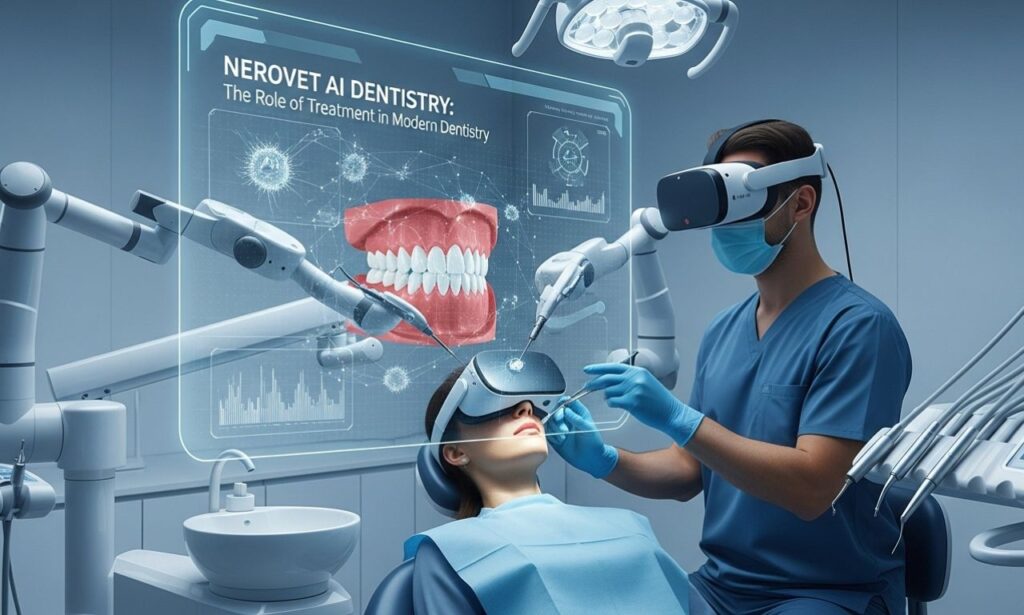Imagine a world where dental visits are not only efficient but also tailored to your individual needs through advanced technology. Welcome to the realm of Nerovet AI dentistry! This innovative approach combines cutting-edge artificial intelligence with traditional dental practices, transforming how we understand oral health and treatment methods. As patients become more informed and involved in their care, the integration of AI is reshaping modern dentistry into something smarter and more patient-centered than ever before. Get ready to explore this fascinating intersection of technology and healthcare that promises to revolutionize your experience at the dentist’s office.
What is Nerovet ai dentistry and How Does it Work?
Nerovet ai dentistry represents a groundbreaking fusion of artificial intelligence and dental care. This innovative approach leverages advanced algorithms to enhance diagnostic accuracy and treatment plans.
At its core, Nerovet uses machine learning to analyze vast amounts of data from patient records, imaging, and even genetic information. By processing these inputs quickly, it can identify potential issues that might escape human observation.
The system generates personalized treatment recommendations based on individual patient needs. It assists dentists in making informed decisions by providing real-time support during procedures.
Moreover, Nerovet continually learns from each interaction. As more data is processed, the technology becomes increasingly adept at predicting outcomes and optimizing practices within modern dentistry. This dynamic evolution marks a significant step toward precision in oral health management.
Benefits of AI in Dentistry
AI is revolutionizing dentistry in numerous ways. One of the most significant benefits is enhanced diagnostic accuracy. AI algorithms can analyze radiographs and images with remarkable precision, often spotting issues that a human eye might miss.
Speed is another advantage. Through automation of routine tasks like data entry and appointment scheduling, AI frees up dental professionals to focus on patient care. This leads to quicker service and improved patient satisfaction.
Personalized treatment plans are becoming more attainable as well. Machine learning models can help dentists tailor solutions based on individual patient data, ensuring optimal outcomes for treatments.
Additionally, monitoring tools powered by AI enable continuous assessment of oral health over time. These innovations allow for early intervention when problems arise, ultimately preserving patients’ smiles longer than ever before.
Common Applications of AI in Dentistry
AI is transforming various aspects of dentistry, making processes more efficient and precise. One key application is in diagnostic imaging. AI algorithms analyze X-rays and scans with remarkable accuracy, helping dentists detect cavities, fractures, or other anomalies that might be missed by the human eye.
Another significant use of AI lies in treatment planning. By considering patient history and current dental health data, AI can suggest optimal treatment options tailored to individual needs.
Patient management systems are also benefiting from AI technology. These systems streamline appointment scheduling and reminders while analyzing patient feedback for better service delivery.
Moreover, AI-driven chatbots provide real-time support to patients seeking information about procedures or aftercare instructions. This enhances patient experience by offering immediate answers without burdening office staff.
With these applications gaining traction, the integration of nerovet ai dentistry continues to reshape how professionals deliver care.
Challenges and Limitations of AI in Dentistry
As promising as nerovet ai dentistry may be, it faces several challenges. One significant issue is data privacy. Dental practices must handle sensitive patient information with care, raising concerns about how AI systems store and process this data.
Another limitation lies in the technology’s reliance on high-quality data for training. If the datasets are biased or incomplete, the AI could produce inaccurate results that affect diagnosis and treatment plans.
Additionally, there’s a learning curve associated with integrating AI into dental practices. Dentists and staff need adequate training to utilize these advanced tools effectively.
Cost can be a barrier. Implementing sophisticated AI solutions requires substantial investment in both software and hardware, which may not be feasible for all dental offices. These hurdles highlight that while nerovet ai dentistry holds great potential, its full integration into everyday practice might take time.
The Future of Nerovet ai Dentistry
The future of Nerovet AI dentistry is poised for remarkable advancements. As technology evolves, we can expect even more precise diagnostics and treatment planning tailored to individual needs.
Integrating cutting-edge algorithms will enhance patient outcomes significantly. Real-time data analysis could streamline procedures, making them faster and less invasive.
Moreover, the education aspect will transform. Dentists might receive continuous learning updates through AI systems that analyze emerging trends and research instantly.
As collaboration between humans and machines grows stronger, ethical considerations will also emerge. Ensuring patient privacy while maintaining efficiency becomes paramount.
With increasing accessibility to AI tools, dental care may become more affordable. This shift could lead to a wider population receiving high-quality treatments without financial strain.
Innovation in materials used alongside AI technologies promises improved durability and aesthetics in dental work, shaping a new era of oral health solutions.
Conclusion
Nerovet ai dentistry represents a significant advancement in the field of oral health. As AI technology continues to evolve, its integration into dental practices will likely become even more refined and widespread. This innovative approach not only enhances diagnostic accuracy but also improves treatment outcomes for patients.
By leveraging data-driven insights, dentists can offer personalized care tailored to individual needs. The potential for early detection of issues is especially promising, allowing practitioners to address problems before they escalate. Moreover, the efficiency brought by artificial intelligence streamlines processes, making dental visits quicker and less burdensome.
Despite some challenges and limitations that accompany this technology—such as data privacy concerns or the need for continuous updates—the benefits far outweigh these drawbacks. As we look ahead, it’s clear that nerovet ai dentistry will play a crucial role in shaping modern dental practices and enhancing patient experiences across the globe.
The future holds exciting possibilities as research advances and new applications emerge within this domain. With ongoing innovations in nerovet ai dentistry, patients can expect higher standards of care while providers can improve their practice’s overall effectiveness. Embracing this technological shift may very well be key to achieving better oral health outcomes for everyone involved.







